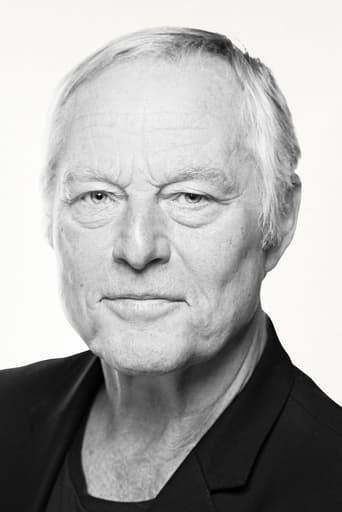mimandzi
O'Horten is a film that revolves around the adventures and misadventures of Odd Horten, a train conductor played by Baard Owe. He interacts with a number of individuals but his main interactions are with Svea who rents rooms and is played by Henny Moan, a character known only as Flo portrayed by Bjorn Floberg and Trygve Sissener a proclaimed ex-diplomat portrayed by Espen Skjonberg. I believe the theme of this movie is that you must overcome your fears to truly enjoy life. This is a Norwegian film set in Norway and Odd is a train engineer retiring after 40 years with the railroad. The beginning of the film shows Odd dressing in a uniform and then heading to the train station, where we learn he is an engineer when he sits down at the controls of a train. About 6 minutes into the film, the first words are spoken and we learn that Odd is retiring. There is minimal conversation throughout the film and it is used to give the viewers additional background on Odd's life and explain details about other characters. This film relies heavily on visual cues to convey both funny and poignant moments. The viewers get a sense that Odd's life has been very predictable and possibly even monotonous. The one thing he appears to look forward to is spending the night and having dinner at the establishment that Svea runs. His monotony all changes beginning with his retirement party, his attempt to join his companions in an after party, sleeping in a strangers home based on a child's demands, the arrest of a chef, his airport adventures when his is looking for Flo but is detained and searched yet also given unlimited access to all areas, the visit to his favorite tobacco shop, falling asleep in a sauna and a subsequent skinny dip and his adventures with Trygve who he finds laying in a gutter and eventually agrees to take a ride with Trygve as he drives a car blindfolded. The lighting in the film is predominantly low key which serves to emphasize the monotony and predictability of Odd's life and reflects that much of the film takes place in the evening and night but even the days are overcast. We see a change once he embraces his fears and finds that life does not need to follow a formula or script but can change if you want it to.
jaredmobarak
There is no more appropriate a name for the lead role in Bent Hamer's film O'Horten then Odd Horten. For a man of modesty, generally hiding in the corners of life to avoid much interaction or attention, he finds himself in the middle of some very odd happenings, all in a matter of a few days following his retirement. After 40 some years as a locomotive engineer in Norway, his age has hit the year for a mandatory moving on, celebrated with a fun rendition of a train picking up speed by the twenty or so engineers surrounding him at a farewell dinner—complete with their left arms working as the clamps on the wheels and their right hands thumping their chests. But that oddity is just the beginning of his crazy adventure, one that finds him settling down in the one place he has ever been truly happy. Odd doesn't smile very often, so when he does, you know it's genuine.Hamer has crafted a short little love note to his mother with this film … it is dedicated to her memory. A woman ski jumper, something frowned upon if not allowed at all in the country in the past, a doppelganger for her is included as Horten's own mother, old and mute in convalescence home. Her bravery and willingness to do what pleased her comes through in our hero's trek across Norway, learning along the way that it is never too late to try something new. Being that this man has led a life consisting of probably the exact same activities each and every day, the decision to join his fellow engineers after his goodbye party will unknowingly open up his eyes. With a routine seeing him wake up, smoke his pipe, go to work, visit his mother, and enjoy the company of Svea, a woman who runs a place at the end of his line, watching his attempt to enter an apartment complex under construction shows his indifference to obstacles in his way—he just never had a reason to leap over them until now.Bård Owe portrays Odd with a very quiet effectiveness. The entire film is quite methodical in its unraveling and always focuses on this 67-year-old gentleman, a man of few words. With so many moments devoid of sound, seeing only Owe's expression, you will definitely learn to know this man and what he stands for. It is a nuanced performance and expressive in its lack of expression. So much craziness occurs in the days we see and yet he just goes with it all, escaping when necessary—and it often is. From the night of the party, being trapped in a stranger's apartment by a little boy who wants to be sat with until falling asleep, (Odd of course doesn't open his own eyes until the next morning where he must hide under the bed to not be discovered by the boy's father and then sneak out the door), to staying after hours in the gymnasium sauna and deciding to take a late night skinny dip, (where a couple of young ladies end up having the same thought), and needing to leave quickly in women's heeled shoes, Horten is out of his element indeed.For being only ninety minutes in length, the film does seem to drag a bit. This isn't a problem by any means, just an observation and caution to any prospective viewers. With little action, O'Horten is a character driven story through and through. The camera follows Odd around as he tries to pass the time of retirement, finding it is much harder than he could have imagined. But it is just quirky enough to become invested to see exactly where it will all lead. There are some genuinely surreal moments, like that of a businessman sliding down a hilled street after the fall of frozen rain while Odd holds on tight to a pole so as not to fall, and some lovely revelations, like of who Trygve Sissener really is, (a very intriguing fellow played by Espen Skjønberg that is discovered sleeping in the street as though a bum, yet in possession of a large house in Oslo). Even a journey to find an acquaintance named Flo, Bjørn Floberg, is a sight to experience because its relatively straightforward task to sell his boat becomes one of multiple metal detectors at the airport, a cavity search, and a human scavenger hunt he tried to avoid right from the start.The camera-work is nice, including some memorable moments, the one that stuck with me being an overhead view of an Oslo intersection as Odd waits for the police to claim his recently deceased friend, to which he then slowly makes his way down the road, avoiding any unnecessary conversation as usual. In what is probably the most exciting three days of his life, it becomes apparent to him that life is too short—ironic being that he is almost seventy upon this revelation, but true nonetheless. He knows that his mother was disappointed he never followed her passion for ski jumping, but the years kept passing and he still had not taken the plunge. Sometimes it takes an unexpected arrest, trespassing on private property, driving down a street blind, and for once not showing up for work to finally awaken to the endless possibilities of life. Odd discovers that it is never too late, and if this stoic, loner of a man can find adventure, then anyone can. If the door is locked, maybe you have to climb up the scaffolding; sometimes you just have to be willing to take the chance.
richard_sleboe
Rhapsodic. Anti-climactic. Deadpan. Superbly lit, shot, and cut. Writer-director-producer Bent Hamer's unique blend of vision and attention to detail makes sure that everything fits in this gem of an art-house movie. It's uneventful and unprecedented at the same time. In the process of telling the story of Odd Horten's retirement, Bent Hamer paints an affectionate portrait of his quiet hero. We never know what's really going on in Odd Horten's mind, but we learn a great deal about him just from watching him go about his daily routine during his final days as an award-winning locomotive driver on the Oslo-Bergen express. Odd is a loving son, an early riser, a drinker of black coffee, a pipe smoker, a boat owner, a late-night sauna-goer. Late one night, on his way home, he meets Trygve, a schizophrenic inventor who likes to drive his Citroen with his eyes closed. What Trygve says of his brother is also true for Odd: He does things in his own way. The segment about Odd's exhausting attempt to pay a visit to his friend Flo, an airport worker, alone is worth the ticket. Great instrumental score by John Erik Kaada. Not for everyone, but if you like it odd, Odd is your man.





